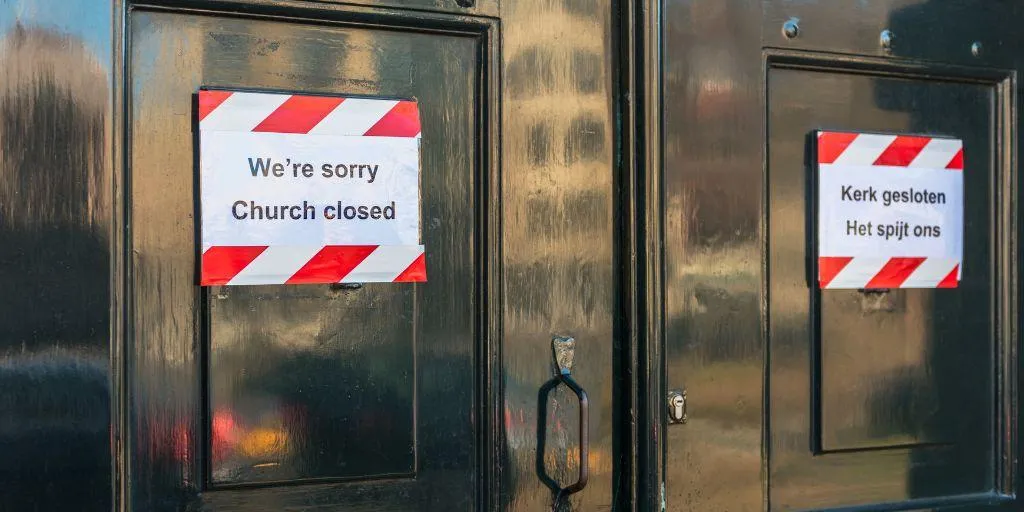Church Marketing & Management Blog
Learn How to Grow Your Church and Further Your Message

Answering the Tough Question: Why Do Churches Close?
Here’s a question that frightens even the most faithful and passionate church leader: Why do churches close?
The reason church leaders don’t want to ask this question is likely because it’s hard to consider that something they are doing might not be working. They put so much time and heart into their ministry, and nobody wants to believe they have wasted that effort.
But no matter how unpleasant the question is to answer, church leaders with declining memberships cannot afford to ignore it. A recent study found that between 3,850 and 7,700 houses of worship have closed their doors each year over the last decade. And those closures are trending up.
On top of that, millions of people have skipped services during the COVID-19 pandemic. And the question remains how many will return to in-person church services.
It’s hard to know what the net loss is exactly because not all closures are reported, and often congregations splinter and create new churches after the old ones have closed. Even so, this alarming statistic represents a tragic loss for faithful congregants who depend on their local church for spiritual growth.
Let’s dive into why churches close and what can be done to reverse the worrying trend...
Why Do Churches Close?

Many houses of worship that are forced to shutter their doors are local churches in small towns with small, aging congregations. They are unable to find new members to sustain their numbers.
But all too often, closures happen because church leaders have failed to adapt to new circumstances or as a result of an inward-looking mindset of the church members.
The good news is this decline can be reversed once we understand the answer to that tough question: Why do churches close?
Here are a few common reasons why churches fail:
Resistance to change. For a church to grow, it has to have room to evolve as new members come on board. But even minor changes to tradition, such as doing away with hymnals and projecting words of hymns onto a wall instead, can be so unpopular that some people leave. If your church base is resistant to any changes you decide to make, prepare for some members to leave your church.
Failure to grow/keep your donor base. The church needs money to keep the lights on. As a congregation dwindles, so does the cash flow. Therefore, as membership numbers fall, it’s even more critical to intensify your fundraising efforts and make it as easy as possible for your remaining members to donate.
Failure to embrace technology. Millennials and other young people have a reputation for being connected to their phones and technology. The standard wisdom is that this means they are not receptive to the Word. But, using social media is actually a great way to reach and minister the word of God within their comfort zone.
Failure to expand leadership. One person cannot do everything. As the church grows, so will the need for staff and other leaders in the church. A pastor must be prepared to delegate tasks to other church members and guide them into church leadership positions.
Lack of a clear vision for their ministry. Many small churches have forgotten why they exist. Be clear where you want your church to go, what you want it to do, and how you want it to grow.
Failure to adapt to COVID-19. Many smaller churches with older congregations have been struggling before the pandemic and have also failed to adapt to COVID-19. They are now most at risk of being unable to recover after the pandemic, according to the Rev. Gloria E. White-Hammond, lecturer at the Harvard Divinity School.
Now that you have an answer to the question of why do churches close, the next step is to identify if your own church is in immediate danger of closing. If it is, you’ll need to take immediate action to save it.
What Are the Indicators That a Church Is About to Close?
To help assess whether your church is already in a ”death spiral,” Thom S. Rainer, President and CEO of Lifeway Christian Resources, lists the following signs that your church has reached or is close to the tipping point:
Your attendance has been declining for four or more years.
The church no longer reflects the community.
Most congregants are senior adults.
The church focuses more on the past than on the future.
Members focus on their own priorities and preferences over the collective good of ministering to others.
The budget focuses almost entirely on meeting the cost of basic operations with little funding allocated for ministry and other programs.
Members cling to certain facilities that no longer serve their purpose—refusing, for example, to replace pews with chairs. This puts their emotional attachment above the needs of the whole congregation.
Members fiercely resist change.
Rainer says that if your church faces four or more of these issues, it’s potentially on a path to closing its doors.
For a church to survive and prosper, it has got to be flexible when circumstances make it necessary. People expect the church to be a pillar in the community, and they expect that the church is reaching out to people beyond their own four walls.
What Can Churches Do Better?

It takes a strong person to admit that what they’ve been doing is wrong. It takes an even stronger person to make a change once they’ve realized they were wrong. Equally, if your congregation is dwindling and you don’t want your church to die, you need to try something different.
The bottom line is you can’t keep doing the same thing over and over, expecting different results.
Once you are open to change, there are some steps you can take to reverse the decline of your failing church.
Adjust Your Stance on Marketing
Marketing can go a long way toward making people in your community aware of where your church is, what your mission is, and why they should join. At first sight, marketing may appear to be more associated with profit-driven businesses, but it actually uses many of the same principles as ministering. Applying the biblical principles of marketing will help introduce people to the Good News and develop faith in new believers.
Refresh Your Website and Optimize for Local Search
Your church website is one of the most effective tools available to spread the word about your church and its mission. But equally, your website should be eye-catching, informative, easy to navigate, and mobile friendly to be effective.
Just as important is optimizing your website so people in your backyard and beyond can find you easily by searching the internet. Local search engine optimization (SEO) is an incredibly effective way to achieve this. SEO is a process that marketers use to make websites rank organically on Google and other search engines, and it can transform your efforts to reseed your congregation.
Put Your Sermons Online
A church without an online presence misses out on major opportunities to bring in new members.
Now more than ever, embracing technology is critical for many churches to survive.
During the COVID-19 lockdowns, millions of worshippers opted not to go to services in person. Online services allow members to attend services at home and stay engaged with the church. This improves the chance of recovering those members after the pandemic.
Plus, today’s families are incredibly busy, especially if they have more than one child. Even the most faithful congregants have obligations that take them out of church once in a while. The key to retaining members is to keep them engaged and in the loop.
Having the ability to watch a sermon they missed or even to rewatch it later in the week for encouragement is an awesome way to keep members engaged.
Engage Your Congregation with Email and Social Media
Imagine the value you’d provide to people in your community if you posted a daily devotional or offered a few words of encouragement from your church’s website and social media. A church without an online presence in today’s digital world is missing out on major opportunities to expand their ministry and bring in new members.
Social media is one of the most effective ways to engage your church community. Whether you post general news on your Facebook page, run paid ads for your church, or captivate members on Instagram, it will only strengthen your ability to get the word out about your church.
Churches and ministries can also benefit when they use email to spread their message and keep members (and potential members) engaged and informed.
Post Questionnaires to Help People Find Their God-Given Talents
Often the people in your church are confused about what their calling may be. Many people think you don’t have a calling if you aren’t preaching or teaching in a church.
This belief couldn’t be further from the truth. Everybody in your church has a job they can do. Try creating a questionnaire to help them figure it out.
Provide a Clear Path toward Involvement
Sometimes people just want to be told what to do. Your job as a leader is to delegate tasks to fulfill your mission. You don’t have to do it alone. Reach out to people and tell them how they can get involved
Create a list of things that need to be done in the church and post it on the bulletin board and your church website.
Create Ways to Collect Donations Online
While your church’s main goal isn’t to make money, if you don’t raise funds, you won’t be able to keep the doors open.
It’s imperative that you give your members as many easy options to donate as possible, including through your website. The opportunity to collect money from members in person is on the decline.
Even before COVID-19, 50% of people didn’t use or carry cash. But with concerns about transmitting the virus, that figure is even lower. So members are far less likely to carry cash in their pockets than before the pandemic.
How many people would like to donate to your church but find it inconvenient to get money from an ATM to put on the collection plate? How many faithful worshippers would like to donate but have opted not to attend services in person?
Giving them the option to donate online is critical for maintaining giving at a pre-pandemic level.
Ultimately, the keyword here is engagement. Your ministry needs to challenge and engage its members. They want to be involved, and a great leader will find ways to make that easy.
In today’s digital age, the most effective way to engage people is to use online resources.
Closing Thoughts on Why Churches Fail
The short answer to the question why do churches close is that the ministry is often not doing enough to challenge and engage its members. So, it’s time to take steps to rectify that by putting resources online for your members and the community.
You may face resistance at first, but that’s okay. When your church is thriving because of the changes you’ve made, you can look back on that moment when you decided to make your ministry what it should be.
Need some additional advice? Download our FREE Ultimate Guide to Church Marketing Tools & Tactics.
Frequently Asked Questions
Q:
We already have software tools and don't want to lose that data by switching. What's the solution?
The data you collect is important, so you don’t want to lose it. It helps you stay connected to the people who look to you for guidance.
The BeyondSundays team would assess your current tech profile and recommend the best way to move your existing assets to BeyondSundays.
Q:
How does this integrate with my church app?
The BeyondSundays App has an API (Application Program Interface) that can connect with most other apps and software. Most apps are able to communicate seamlessly with BeyondSundays.
Q:
What kind of support does the BeyondSundays team offer my church?
BeyondSundays was built by a full-service marketing agency, dedicated to communicating His word and assisting the churches in their efforts to do so. Beyond the mechanics, we are equipped to assist in all facets of marketing and strategic planning. You can see a full list of our services here.
Q:
How is filled-out web form information funneled to BeyondSundays?
Your BeyondSundays app in-house webforms and landing pages can easily be installed on your existing website. From there the data is already within your BeyondSundays app. If you use your own webforms, the data will be transmitted via the API.
Get Our Free "Ultimate Guide to Church Marketing Tools & Tactics"
At BeyondSundays, we're more than just another app, software platform or tech tool. We're driven by a passion for helping churches, ministries and other Christ-centered nonprofits.
BeyondSundays
More
© Copyright 2026. BeyondSundays. All rights reserved.

